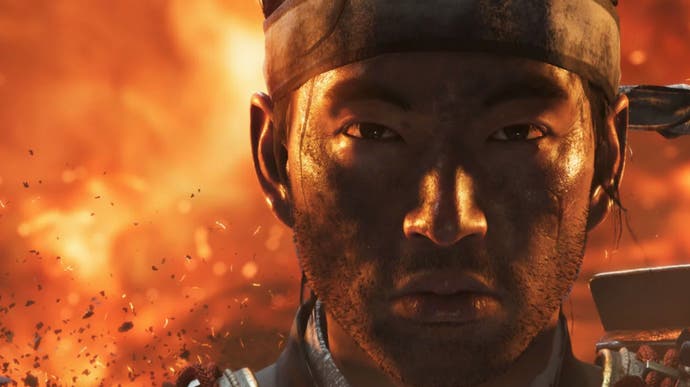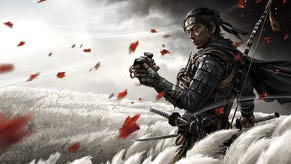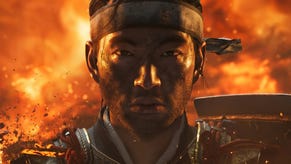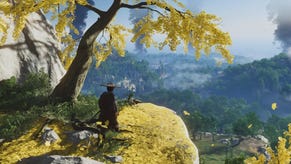Ghost of Tsushima's E3 debut analysed: a stunning late-gen showcase
Sucker Punch bookends the PlayStation 4 era in style.
It may have been a Sony E3 media briefing short on new announcements, but there was no shortage of spectacle. Alongside The Last of Us Part 2, the gameplay debut for Ghost of Tsushima took us to the war-torn grasslands of 13th century Japan, depicted via a masterclass in real-time rendering, animation and physics simulation. Looking at its stunning opening vista shot, you'd be forgiven for thinking this is running on future Sony hardware - a prototype PlayStation 5, perhaps. At first glance, the environment animation, particle effects and lighting look a generation ahead - and certainly it's a big stylistic jump from the studio's previous work on InFamous First Light. But as the end credit tile reveals, the demo runs on hardware you may already own. It's a PS4 Pro, and so, the real surprise is the technical ingenuity going on in order to achieve such great results on existing console technology.
This game's significant for PS4 in other ways too. Flip back the calendar to E3 2013; InFamous Second Son is privately demoed as a launch title for the unreleased PlayStation 4, and I was there to see it in a hands-off demo at Sony's press area. Next to the likes of Knack and an early build of DriveClub, it was easily the best-looking game shown on the system. Now, five years on, it's fitting that the same developer is book-ending the generation with a new release - with rumours circulating of a PlayStation 5 port as well. Ghost of Tsushima has huge potential as a cross-gen title, but in the here and now, it's squeezing the most it can from the existing PlayStation consoles. The results are terrific.
Ghost of Tsushima stands on its own, away from InFamous' shadow. There are no waypoints for example, and you're free to carve your own path through feudal Japan with a samurai blade. Another curious point is the lack of UI during the demo, even button prompts. The minimalist design works wonders for the game's aesthetic - a cinematic framing that evokes some of the best films based on the same historical period, especially Akira Kurosawa's Ran. Those huge, billowing environments feel wider and broader, and blade-to-blade combat comes across as suitably raw and instinctive. Unlikely as it is that the HUD stays disabled come release, for the sake of authenticity, I hope we're given the option toggle it off.
So if the title was shown running on PlayStation 4 Pro, how does Sucker Punch leverage the system? It took a while for 4K media to filter through from Sony after the event, but now we have some answers: the demo renders at a 3200x1800 resolution - just like Sucker Punch's InFamous upgrade. And again, in common with the studio's prior work, checkerboarding is implemented, noticeable mainly on transparencies such as grass, where zooming in really close reveals tell-tale cross-hatching. By and large, the image holds up beautifully though. PS4 Pro's feature parity with InFamous here bodes well for the standard console - if the same parity applies, we should see the same experience operating at 1080p.
Otherwise, the demo stands out in three areas: the swathes of plant life, the physics interaction, and also Sucker Punch's post-effects pipeline. Of course, the breadth of swaying plants in that opening shot is staggering, and the first thing to catch the eye. The draw distance is quite unlike anything we've seen this generation, and even a game like The Witcher 3 with its White Orchard area had to prune back its rendering range to cope on current-gen systems. By contrast, Ghost of Tsushima shows no sign of pop-in at all. Combined with PS4 Pro's 1800p resolution, you can see the wind causing a ripple-effect across a sea of white, and even a siege on a village far away the distance.
What takes this to the next level is the physics simulation. It's a showcase feature across the demo, and a big focus for Sucker Punch's engine next to the more static cityscapes of InFamous. Grass bends around Jin's horse as it gallops through the meadow, and individual tousles of hair in its tail bounce against each other mid-stride. Most impressive of all is the final showdown though. Hundreds of leaves swirl around the legs of our hero, as he makes sharp lunges forward. A burst of energy forcing a clear line across the ground, but it's impermanent, and these patches are covered up again by a new wave of leaves falling from a nearby tree.
Everything is affected. Clothing ripples in the wind, and even flags, ropes and everything in between flap during the initial horse-ride too. Now let's be clear: Ghost of Tsushima puts a big emphasis on the stillness of its warriors. Whether it's the characters engaged in a stand-off - waiting for the opponent to strike - or a chance to take in the view, the interplay with physics offsets that lack of motion beautifully. At every moment the screen feels alive - even if that moment is a quiet one.
Another great touch is the lighting. Over the course of the demo, a conscious effort is made to have the sun slowly set; from the grasslands, to the temple, to the final battle, each area incidentally has a different tone as a result. At the start, the leaves glisten brightly, and bloom blends in with the layer of mist across the grass. You can catch streaks of god rays firing down between the dark clouds - but everything is clearly lit to show off that open space. It's a dynamic time of day - and shadows are affected by the sun's position, casting detailed shade from branches.
But everything changes by the demo's end. It finishes on a beautiful contrast between light and dark - that low sun casting a silhouette effect on the two dueling samurai. You can't pick out character detail from the shade, but the idea is perfectly executed - a great, cinematic moment born from technical design. Better still is the way light flits between the pockets of flying leaves, lit ash and smoke, only adding to the sense of climax. Here's a neat little extra for this scene; leaves have opacity to reveal light - meaning, as torched arrows fire behind trees, each leaf brightens.
The demo is full of small details that make the most of PS4 Pro - and it's hard to see a base PS4 making too many radical cuts to the core design. Screen-space reflection are a real highlight - used in the mud to mirror everything within the camera's frame - if perhaps, at a lower resolution than the gameplay. It means everything gets factored in, including characters, and swaying trees, though the technique does suffer from a few tell-tale quirks. Foreground elements seem to complicate the end result, and let's say a character gets too close to the screen, the reflection below his arm will be blank. Overall, the result is still eye-catching, and creates a realistic effect.
Another real highlight is the post-effects Sucker Punch is able to repurpose from the InFamous games. A great bokeh depth of field kicks in during slo-mo ripostes, and the final showdown. Our favourite use of it is when the focal range changes slowly on that ending fight. The focus transitions, gradually, from the background character to the foreground, creating a diffuse effect on specular points. On top of the physics and lighting, it rounds off an utterly cinematic result for this finale.
As a swansong for the PlayStation 4, Ghost of Tsushima is shaping up beautifully. Many of the best, most memorable games come during a console's twilight years - the final stretch, where a developer's confidence with the hardware is at a peak. And that's the irony; PS4 Pro may be the console in the limelight here, but it doesn't come across as dated by any means. The standard PS4 isn't accounted for, but even so we're looking at results that feel fresh, and feed off a technical proficiency that's grown over the last five plus years. Rumours persist that Tsushima is a cross-gen game that may also appear on PlayStation 5, so it begs the question where Sucker Punch could take it. A Ryzen-powered 60fps experience with a further bump to resolution would look amazing, but what this demo proves conclusively is that the current-gen machines aren't likely to be left behind - Ghost of Tsushima looks stunning.











